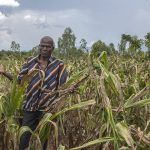Africa is the most exposed region to the adverse effects of climate change despite contributing the least to global warming. The brunt of this human instigated disaster is hitting the African continent, and urgent and decisive action needs to be taken to avert catastrophe.
Assessments by African Development Bank (AfDB) reveal that African countries are losing up to 5% of their GDP to climate change on an annual basis, while projections by the African Climate Policy Centre have shown that exposed regions such as the Sahel may lose up to 15% of GDP by 2030.
Governments are uniquely positioned to catalyse and orchestrate the type of multidimensional response required to tackle climate change, which entails reducing emissions and ensuring the transition to green economies. However, governments alone cannot achieve climate goals; partnerships, both intragovernmental as well as public and private, are important, with the private sector a critical partner to government in delivering development cooperation on environmental issues.
According to AfDB, the private sector is key to Africa’s green economic transformation. Climate change presents a $3 trillion investment opportunity in Africa by 2030. Some 75% of this is expected to come from the private sector to complement public sector financing. This calls for innovative approaches to attract and steer financial flows consistent with a pathway towards low-carbon and climate-resilient development.
“The private sector will be the driver of any green recovery that takes place in Africa – as it is the African private sector that will allow African nations to claim ownership of climate resilience responses,” says Jean-Paul Adam, the director of the technology, climate change and natural resource management division at the United Nations Economic Commission for Africa. “For example, one of the biggest challenges around traditional fossil fuel-based energy is that even when resources such as oil or gas exist in African countries, the centres of value addition are often situated elsewhere. With renewables, it is easier to create an inclusive value chain, but by no means is the existence of such a chain automatic. It requires African firms investing in capacity building – both in terms of human resources and technological capacity – to be well-situated to make use of renewable opportunities.”
Jayne Mammatt, the environmental, social and (corporate) governance Africa leader for PricewaterhouseCoopers (PwC) Limited Africa, says one of the key steps private companies can take is to commit to net zero and work with governments to make that feasible. They can do this by making a commitment through the Science Based Targets initiative (SBTi) or joining the Race to Zero campaign. They can then take an active role in working to decarbonise their value chains, and engage in public policy discussions to push governments towards greener alternatives.
“Setting a commitment is only the first step; private companies then need to work hard to achieve these commitments. The ultimate impact of private companies achieving this commitment would be increased jobs in the green economy as the companies purchase more electricity from renewable energy providers, increasing available finance for green industries and reducing the costs of these technologies as supply and demand increase,” says Mammatt.
Dharish David, a research manager in the political economy faculty at the Singapore Institute of Management, says public finance can and will play a critical role in jump starting, leveraging, and guiding green investments, but transformational change will inevitably require large-scale private financing.
“Private-sector partnerships and green investment banks can be used to effectively finance low-carbon infrastructure to fight climate change,” says David. “Public-private partnerships (PPPs) and green investment banks (GIBs) provide much-needed leverage to public investment and bridge the public-private sector efforts to ensure that green energy projects can find the funds they need in time and to scale. PPPs and GIBs allow the private sector to share the risks and opportunities of green energy investments. Governments will need to provide guarantees for upfront funding, incentives to upscale green technologies and effective means for risk transfer, and concessions to those willing to enter and sustain markets.”
The UN ECA’s Jean-Paul Adam says governments also need to provide the right regulatory framework. “This is a field where the ECA is active in supporting the development of investment friendly frameworks in various African countries through Sustainable Development Goal (SDG) 7 (universal access to energy) initiative,” he says. “The private sector in Africa can take the lead in building sustainable value chains around key sectors such as energy or agriculture. The recently launched African Continental Free Trade Area (AfCFTA) can be an accelerator for the African private sector to be drivers of the green recovery.”
Public-private partnerships in effect allow investment risks to be shared among key stakeholders — governments, lenders, and implementers on projects that have traditionally been executed or financed by the public sector. “Key to the public and private sector ensuring effective partnerships is transparency between both parties,” Mammatt says. “Governments achieve this through stable and transparent policies and regulations – including taxes and subsidies that support investment in green sectors while ensuring the protection of jobs. This trust is created through government setting policies that clearly demonstrate the direction of travel towards greener economies, followed by action and regulations that create the freedom – and restrictions, where needed, for companies to navigate these spaces.”
“Similarly, the private sector needs to work with governments to achieve their development goals and ambitions – investing in business in the country in which the company operates, transparent tax disclosure and ensuring positive returns for the in-country stakeholders,” explains Mammatt.
“Appropriate prioritisation of climate resilient investment is required,” Adam notes. “Thus, nationally determined contributions must be mainstreamed in development planning. This provides a clear signal to the private sector for long-term investment prospects for investment in these sectors. This planning must also be linked with resources for investment. In this case, governments can take the lead with a clear regulatory framework that encourages investment in green sectors. This should be done mainly because of the economic competitiveness that African countries can achieve, and not only because of the environmental benefits.”
He points out that mobilising the more than $3 trillion investment for mitigation and adaptation required by 2030 will be a challenge, but is mainly an opportunity. “In energy, in particular, these are secure investments, which can be attractive for investors both from within the continent or from foreign direct investment,” Adam says. “Within Africa, financing remains challenging due to liquidity constraints, diminishing revenue streams for government and the relatively high cost of capital.
“The ECA’s SDG7 initiative seeks to address the problem from three angles: providing policy support for governance, technical guidance on the right energy mix to ensure common understanding on the technological needs of the sector, and also supporting the mobilisation of private sector finance. This recently culminated in support for South Africa’s issuance of a R3 billion green bond for the refinancing of its energy sector.”
However, Adam cautions, “in promoting public-private partnerships, care must be taken to minimise challenges, seize opportunities and scale up best practices. “South Africa’s recent bond issuance is an example of how a national statement of ambition, with strong government backing, can attract global attention. The investment by PIMCO, one of the largest financial firms in the world, is a clear marker of the scale of the opportunity available in Africa,” Adam says. “We can also flag the African Accelerated Adaptation Programme (AAP) launched by the AfDB, which seeks to mobilise at least $25 billion for investment in adaptation in Africa.”
But, he adds, these positive examples should not mask the reality of how large the needs are for climate resilient investment on the continent, and that the availability of predictable and affordable financial resources remain among the biggest challenges.
Would you like to gain an understanding of your own impact on the environment? Calculate your own carbon footprint here
Raphael Obonyo is a public policy analyst. He’s served as a consultant with the UN Department of Economic and Social Affairs (UNDESA). An alumnus of Duke University, he has authored and co-authored numerous books, including Conversations about the Youth in Kenya (2015). He is a TEDx fellow and has won various awards.













